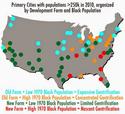Newgeography.com - Economic, demographic, and political commentary about places
For more than a century, Southern Californians have dreamed of their region becoming host to a great global city. At the turn of the 20th century Henry Huntington, who built much of the area’s first mass-transit system, proclaimed that “Los Angeles is destined to become the most important city in the world.”
Of course, builders of other cities – St. Louis, New Orleans, Chicago and even Cincinnati, Ohio – have made similar predictions. But L.A.’s claim, unlike the others, had a significant resonance. Not only was the region growing rapidly throughout the previous century, and now stands as North America’s second-largest population center, but it dominated a host of fields, notably entertainment and aerospace, and was highly influential in energy, fashion and manufacturing. read more »
by Anonymous 08/29/2014
Inspired by a recent visit to a Le Corbusier-designed Dominican monastery near the French city of Lyon, I’ve been thinking a lot about the interaction between Catholicism and modernist aesthetics. It has little to do with whether the Church affects what designers create beyond filling the program. Instead, I’ve tried to examine how the architect’s religion influences the Church’s own self-image. I’ve concluded that the Church, an institution that has been the guardian tradition and the patron artistic and architectural development in the West for almost two millennia, never could reconcile itself comfortably with Modernism. read more »
America’s cognitive elites and many media pundits believe high-density development will dominate the country’s future.
That could be so, but, if it is the case, also expect far fewer Americans — and far more rapid aging of the population.
This is a pattern seen throughout the world. In every major metropolitan area in the high-income world for which we found data — Tokyo, Seoul, London, Paris, Toronto, New York, Los Angeles, and the San Francisco Bay area — inner-core total fertility rates are much lower than those in outer areas. read more »
This is a new report brief from the Center for Population Dynamics at Cleveland State University, download the pdf version here. The report was authored by Richey Piiparinen, Charlie Post, and Jim Russell
Greater Cleveland ranks 8th nationally in the percentage of 25- to 34-year-olds in the labor force with a graduate or professional degree, ahead of such “brain hubs” as Chicago, Seattle, and Austin. The analysis speculates as to whether or not this is a leading indicator to broader economic growth. Comparisons are made with Boston and Pittsburgh—two metros further along in the economic restructuring process. read more »
When our urban pundit class speaks of the future of cities, we are offered glittering images of London, New York, Singapore, or Shanghai. In reality, the future for most of the world’s megacities—places with more than 10 million people—may look more like Dhaka, Mumbai, or Kinshasa: dirty, poverty- and disease-ridden, and environmentally disastrous. read more »
Patterns of gentrification vary by city, and the spread of gentrified areas is partly determined by the city’s predominant development form and the historic levels of African-American populations within them. Gentrification is a nuanced phenomenon along these characteristics, but most people engaged in any gentrification fail to acknowledge the nuances. read more »
The globalization of cities and their elites often comes at the expense of many of the people who live there. Forced to compete with foreign capital and immigrant workers, native-born residents of cities from Los Angeles and London to Singapore often feel displaced, becoming strangers in what they thought was their own place. read more »
The United States lost jobs between 2000 and 2010, the first loss between census years that has been recorded in the nation's history. The decline was attributable to two economic shocks, the contraction following the 9/11 attacks and the Great Recession, the worst financial crisis since the Great Depression. Yet, even in this moribund job market, employment continued to disperse in the nation's major metropolitan areas. read more »
When it comes to attracting the hip and cool, Southern California, long a cultural trendsetter, appears to be falling behind – at least in the view of the national media. Articles about where millennials are, or should be, going rarely mention anywhere in this region as a top choice. read more »
Net migration of people to or from metro areas is reported annually by the Census Bureau and widely discussed. Less well known is that their American Community Survey (ACS) provides migration figures broken down by characteristics such as race, age, income, and educational attainment. This lets us drill into finer grained details about who is moving where.
Here is a map of net migration of people with a bachelor’s degree or higher, based on data from the 2007-2011 ACS, with blue indicating net migration gains and red net migration losses: read more »
|






















